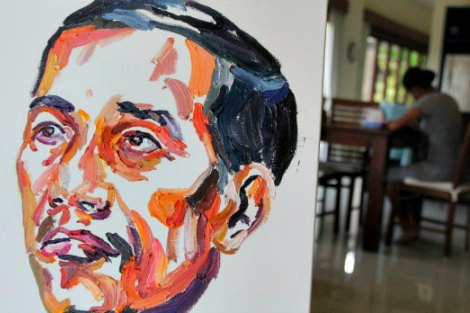 The snow has stopped falling in Boston – finally. It’s melting in fact. People are taking bets whether there will still be snow piled on the sidewalks at the time of the Boston Marathon to be run on April 20. The trial of Dzhokhar Tsarnaev, the surviving Boston 2013 Marathon Bomber, will still be running. Some of his surviving 264 victims have been giving gut wrenching evidence here in the federal court house. The death penalty has been the talk of the town, just as it has been in Australia with people focused on the plight of Andrew Chan and Myuran Sukumaran during many weeks of legal and political manoeuvring with Jakarta.
The snow has stopped falling in Boston – finally. It’s melting in fact. People are taking bets whether there will still be snow piled on the sidewalks at the time of the Boston Marathon to be run on April 20. The trial of Dzhokhar Tsarnaev, the surviving Boston 2013 Marathon Bomber, will still be running. Some of his surviving 264 victims have been giving gut wrenching evidence here in the federal court house. The death penalty has been the talk of the town, just as it has been in Australia with people focused on the plight of Andrew Chan and Myuran Sukumaran during many weeks of legal and political manoeuvring with Jakarta.
Some of the Australian commentary on the Indonesian justice system has been understandably very critical. But living here in the USA for a year, I have come to realise that the death penalty infects every justice system no matter how good and robust it is. In the end, the death penalty is always political. That’s why I am very grateful to Pope John Paul II who changed his position on the death penalty saying that there is no warrant for its use, provided only you can guarantee the protection of the community by the long-term incarceration of the unrepentant serious offender.
It took over two months to empanel a jury for the marathon bomber. They had to find 12 jurors and 6 replacements who were ‘death ready’. They had to be jurors who would be prepared to impose the death penalty if some of the federal offences were proved. That’s hard in the state of Massachusetts where they have abolished the death penalty. The court drew from a jury panel of 1,350 persons. They had to complete a 28 page questionnaire as part of the selection process. Except for the death penalty, Tsarnaev would have pleaded guilty. His trial would be long finished; he would now be serving life imprisonment, and people would be spared the months of agony debating his death sentence.
The US Supreme Court has a few horrific death penalty cases coming up this month. Two cases come out of Alabama where the state judges are elected, often on law and order platforms. The state judges have the power to override the jury decision on the death penalty. Since 1976 when the Supreme Court reinstated the death penalty, Alabama judges have imposed the death penalty 101 times when the jury has recommended only life imprisonment. Meanwhile they have overridden the jury recommendation of the death penalty only 10 times.
The jury for Courtney Lockhart who had spent 16 months as a soldier in Iraq voted unanimously that he serve life imprisonment because, as Justice Sotomayor of the US Supreme Court wrote, his life had been ‘influenced by mitigating circumstances relating to severe psychological problems he suffered as a result of his combat in Iraq’. 64 soldiers from his brigade never made it home; 12 who did have been arrested for murders or attempted murders committed since their return home.
The other case is from Oklahoma where they use a three drug protocol to kill the prisoner. The first drug which is supposed to induce the coma is midazolam which is not approved for general use as an anaesthetic. Recently the administration of the drug was botched and a prisoner took 40 minutes to die writhing in pain. The second drug is supposed to paralyse the prisoner, and the third drug stops his heart. The Supreme Court has been asked to decide if it is constitutionally permissible for a state to carry out an execution using these drugs when ‘there is a well-established scientific consensus that the first drug has no pain relieving properties and cannot reliably produce deep, coma like unconsciousness’.
The death penalty is barbaric and unfair. You can never get it right. It’s just so wrong. The Americans are not for changing – yet. We Australians should do all we can to convince our neighbour Indonesia to join the world trend towards abolition of the death penalty. President Joko Widodo provided a slight opening during the discussion of the plight of the two Australians on death row when he said, ‘The Constitution and existing laws still allow [the death penalty] but in the future if it is necessary to change it and [if] the people really want it, why not?’ I hope Myuran Sukumaran was being prophetic when he inscribed his painting of Joko Widodo with the words, ‘People can change.’ I will not miss the horror of the death penalty and the garish court discussions of it when I return to Australia where our last execution was 48 years ago. Thank God.
Frank Brennan SJ, professor of law at Australian Catholic University, is concluding his term as Gasson Professor at the Boston College Law School. This piece first appeared in the Canberra-Goulburn Archdiocese newspaper The Catholic Voice, April 2015